Angelika Reitzer, Wien (A)
The author was born in Graz in 1971 and lives in Vienna. Reitzer was suggested as André Vladimir Heiz' competition sponsor.
Download text in:
Word file format (*.doc)
PDF file format (*.pdf)
Information on the author
Videoportrait
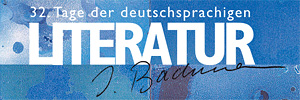
Angelika Reitzer
Super 8
She stood under Albert's balcony (didn't dare call out to him), in a crammed garden : he would come out sometime. Shrubs and bushes were in flower, hardly a free patch of lawn, there was tall grass growing there and garden furniture, which no one used, bicycles and trailers, a hand cart. The occupants left the garden to its sleep, it appeared to have earned it. She had come from a dinner, at which people said things like : my art is my work is my statement about the world. She should really have talked to someone. (But how do you do it : the stuff with signing on and surviving and then good wine as well?) But she had slunk away, before the others could see, what sort she was now.
She could no longer remember, why she was so attached to him, Albert hardly talked; the pieces of furniture in his rooms were like scaled-down reproductions of real furniture. There was no dust on the book cases with the old books, not a hair anywhere. (They had bathed together a couple of times and once she had washed his hair. His fine hair, which consisted only of peaks, was always dry immediately. Just as if he had never dipped under water.) She went there again and again, stood under his balcony.
The wood lies on the water, as if some boats were not even completed or as if they had already been taken apart again. Albert was talking about boats, they were looking down into the dark garden/undergrowth. But she hadn't really understood, which city he was talking about, perhaps he hadn't mentioned it. House boats for sure, and there are cargo ships too. And the containers simply lie around in the water. She had wanted to hear facts or details, but he only said : it's a while ago. That was in my last life. All at once Albert was someone who had travelled, that was something. Since she had known him, he didn't want to leave the city. That's how it was. Now he was talking about living quarters outside the city and on the water, of the maze of wood and metal and huts by the water and on the water and that children clambered around the roofs. Everything keeps on growing, without anything having to be taken away from others. Space, I mean. Then she was the woman on the balcony, she was interested in other facets and finally he talked about a woman, how much he - then she didn't want to hear any more and asked him, if he had paid her for being with him. He said : yes, perhaps; and because she didn't know what else to say, she asked him, whether he had also seen dragon boats and Albert said : oh, dragon boats. Yes, he had seen dragon boats too, but they weren't interesting, and then he talked about the runways by the water, how close the giant machines rose into the air there, and then at last she knew, which city he was talking about.
They had never talked on the phone, Albert didn't have a phone and she never asked for the number of his friends who lived downstairs/rented the first floor to him. Once the woman from the ground floor came to the railings of the terrace. Said without looking at her: he's not living there any more. You must have realised that. Then she had left the overgrown garden and pulled the garden gate shut behind her, she found it hard to leave the house, she couldn't understand it all.
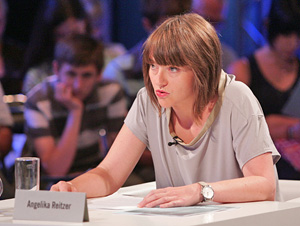
Albert lined up cocaine, which she paid for, because he had no money, she would have liked to have gone to the lake with him, wanted to be in the water. They remained in the bar, he said : isn't it brilliant, that we can drink as much as we want! She danced and paid for both of them at the bar, she was allowed to take him home (that's where I'm staying now), they kissed for a long time, didn't go up together. At a time when several projects had to be taken care of at the same time, she had seen him in the place where glasses of tequila and vodka went round the top of the bar in a circle on a little railway.
She had lots of ideas, and U. liked most of them. He had given her a dictating machine and she dictated. She was responsible for communications and also drew up budgets, when it was necessary. Then she had to look after individual partners, which meant she had to stand beside an information desk like a student. When she locked up, the DJ in the bar next door turned up the volume; she stayed, attached herself to the people from one of the museums and to the artists, then went somewhere else with them and the crew. Once they ended up a long way out on some estate; surrounded by sticky wooden panelling Western or Country music. Albert must have come with the technicians, that didn't bother her. U. had confused her, when he said : we should always be able to reach you. At first it seemed as if he didn't care when she worked on the projects, everything merged with everything else, they ate together, he liked going for walks, she went with him, listened to his monologues and tried to translate them. He didn't pay for her hours after all, he paid for the potential and for success. She took on more and more, personal duties as well, and when the book-keeper said to her : you're the assistant, she didn't know, whether that was meant as acknowledgment.
She sat down at the bar beside Albert. She went home with him and could see everything. He was melancholy, he loved electronic music, which covered everything in the room, that was nice, he wanted to talk to her a little, but not too much, he made peppermint tea/they were already high anyway. Now she went to Albert's house in town, sometimes she left a couple of lines at the door or waited on the stone steps. He would tell her, if he didn't want to see her any more, she was convinced of that.
Then (again) she climbed up the steps behind Albert to the lighting right at the top. There was everything that summer : opera, theatre, quite unbelievable music; the light changed the sounds, displayed the speakers, showed her the figures, she had not known before, in their glittering existence, obscured some things. She loved the mood of the pieces, she liked Albert's colleagues, who sometimes only looked at her inquiringly. Once someone talked about him behind his back as about someone, who wouldn't be there much longer. Then he wasn't there and she watched the performance without him, felt like a traitor. She spent half the night looking for him. Then helped him up the stairs to his flat, they wanted to sleep with one another, he toppled from the settee, there, where she then lay; everything was wet. It took a while before she understood. Later sometime it would all be cleared up. She was attached to him, yes. She just couldn't go on without him. She wanted him whatever his state. Sometimes she felt so without limits in her wanting, that she didn't know how to go on. She always felt these things/which was why she was convinced of the rightness of her feeling : sunbeams wanted to enter the room, the dark heavy curtains prevented most of them from doing so. A layer of him was on everything. His sister lived in the room, who introduced herself tall and slim. Kind-hearted and beautiful as Albert; which he was. She just couldn't cope with his sorrow. Bottles lay and stood on the floor, there were dishes in the sink, it didn't smell good. At first, still half asleep, she tried not to move, she didn't want to feel the wetness on her body, it was already far too late. There's nothing there, she thought, as she opened and shut her heavy lids. She would remain lying here until he woke up and then he could send her away, then she or he would draw a line, but she couldn't like the idea. Albert hadn't told her why he wasn't going to work any more, it seemed to be final for him. She had told him, what his colleagues said about him, that there wasn't enough money, she wanted to comfort him, he had pushed her aside. As if she was annoying him. She still saw something free in him or about him. He was a free man.
She could bear it. She could bear him. As their bodies had bent, he was the contour which she wanted to pull behind her with her limbs, stretch so far, that clarity returned. She wanted to, but he didn't help her. The weight of the last long night burdened the sleeper, what still distinguished him from someone unconscious, who could no longer remember his past days, why did she again and again see this pale grey sterile room around him, as if she had brought in the dirt?
She should let him sleep, she should let him have the peace and quiet that he wanted. Needed. Even now, amidst his refuse, she was the burden. She should be in her own flat, let water run over her shoulders, over her stomach, down her legs and it was still warm; she could wash herself as every morning, she smelled the shampoo, soaped herself, wrapped herself in a big towel and lay down in bed or went out into the day, which should begin now. And then. She couldn't wipe or wash him away. She felt something, she felt the floor, the cold liquid around her, her spoiled skin. She didn't lose him, if she lay down to sleep. Her dreams belonged to him, her sleep belonged to him, she wanted to spend her nights with him, wake up together as before, not lying on the cold floor, he wouldn't stay unconscious, he would regain consciousness, then hers would be there too again. She needed time, and staying power (she had a great deal of all of it).
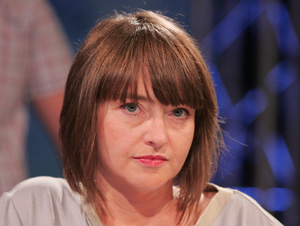
She couldn't switch on her telephone now, see if someone had called. She should have been preparing documents, hadn't been in the office for a couple of days now. Only recently the development had come to a halt, the interactive components in particular were a problem. Then partners had dropped out. She at any rate had done all she could, and more of course, than she would have had to do. Albert didn't take her commitment seriously, called her a reservist. (We are all human material in a great reserve army.) Once it's up and running, we'll expand worldwide. She had been heart and soul for the project and U., the informal and meticulous team leader, who always hinted, that he would find a way, to really express his gratitude to her. She had already been in! She couldn't exactly understand what had changed. Still not. She had been punctual for the meeting with the investors, but when she came up the stairs to the second floor, she knew that punctual is too late. Then men in dark suits were sitting round U's living room table, an absurd situation, she felt uncertain, pushed an office chair up to the low table for herself. Suddenly she was the secretary, who was supposed to serve tea and take notes. She felt paralysed, looked down at herself, but everything was OK, there were no toothpaste stains anywhere, there was no dog shit on her shoe, her trousers were not as new and shiny black as the men's suits, but clean. She forgot about the tea and when she finally brought it, it was undrinkable. She wanted to put on some more, but now no one wanted tea. She went into the kitchen again, which she never wanted to leave. She should. She had to get away from here. But movement wasn't possible now, she couldn't weep, shouting wasn't possible, only waiting. With Albert everything was different.
Once he had given her a book from his collection as a present, an old one.
At the beginning he had said : I'm not good for you, you'll find that out.
Once they had spent the whole night on his little balcony, she had talked about her dream city.
Nor did she know, what she wanted from him, sometimes she considered, whether she should tell him the truth about him and her.
How relieved she was then, when he disappeared once again.
And each time she was sure, that it was only an inadvertent parting.
She had laughed with Albert. She should laugh at him, that's how it had started.
She managed it very well.
With Albert everything was different.
He only needed to be there.
She sat in the huge living room on an exercise bike, she pedalled hard and watched a film. The engine of a large vehicle could be heard from the small parking lot in front of the house/the big electric gate closed, it slid between drive and ramp (so at every homecoming, at every departure inside and outside were clearly separated : that's good, but one might ask, what's better now, to stay inside or to go out?)
The car door slammed shut, now in a moment the door to the house would be opened . The woman on the exercise bike sometimes imagined how her own shadow fetched the girls out of their beds, after drinking coffee, reading the newspaper etc., while she herself cycles the long way on her racing bike to her happy aunt and clearly feels the wind, that's the slipstream, it's to do with the skin, she lets the wheels turn, it's all downhill on the way to the happy aunt. Because the days for her shadow look similar to hers, but shadows don't know about exhaustion. How she is simultaneously close and far away and how her happy aunt tells her about her last trip. How she travels the land from north to south in rattling buses, stays where she wants, of delays of many hours and of the anger and the cheerfulness of the people. That she doesn't need to think about whether a meal is too spicy for the girls, whether they've already been sitting too long in the crowded bus, in which bed they'll all sleep, whether it's clean enough. And when the happy aunt asks about her companion, she says exuberantly : they change, there are enough. On the exercise bike she should have frowned at such a sentence. She heard herself sigh, immediately looked over her shoulder. No one was catching her out. Recently the woman on the exercise bike could not always decide, whether her husband (Gabriel) was on the trips as well. He had become hard-working, ambitious. When he was there, he was a good father, who hadn't just given his daughters exotic names; there was a greater seriousness about him, when he was with them. Gabriel was well matched at the side of her shadow.
His happiness was fixed by various co-ordinates : he had lived the whole of a cheerful youth in anticipation of this future, in which everything would be possible. With his parents and his sisters he had inhabited a building kit, which had grown with the children. Over the years new rooms had come into existence, inside, outside and above their apartment. Friends and outcasts were accommodated, relatives lived with them. Balconies were built and behind the old garden another one was laid out. In the cellar of the house were the little room and a room with a round wall, a big desk. Panelled walls, built-in cupboards, a screen (all from another time, another family). Apart from that the boxrooms, they were as big as the small room, only without windows, and the deep shelves were crammed/when she moved into the house, she had no idea, how one could get an overall view of everything. She had often said : please, always close the doors, because chaos pours out, spreads over the whole cellar. A little while before rain water had penetrated the lower storey, no one had noticed, she didn't want to say anything/she could use everything/after making an inventory of all available memories and now : if the water damage was repaired. (There were ridges in the parquet right under the built in cupboards, since the rain large groups of ants lived there, they roamed around the whole floor, knew the boxrooms, the bathroom and the woman in the cellar, they knew her too. Sometimes she was woken by tickling on her upper arms, shoulders, cheeks. She always showered immediately after getting up, but the ants were always there before her. Washed them away with the thin lukewarm jet. They came again. The spiders were there before the rain, the spiders were there before the people, for sure. Now the soldiers were marching as well. Crowds of them. They filled the cracks. Followed their paths, there were so many places, where the plaster was crumbling a little, that's where they crawled out, the soil under the lawn will be full of them and one day these rooms too.)
She had always been waiting for someone from earlier projects to call again, that someone enquired, they had never managed without her before. She had done so much work and always tried to absorb the unfamiliar material. The few times, when she hadn't known exactly what was being talked about at meetings, had scared her stiff, of course. But she hadn't just caught up. She was good. She was flexible. She was available. The only call from the office was from a woman she didn't know, and who mailed her a list of questions, some with deadlines, all rather uninspired. As if they didn't expect, that she would be working for them again. Now she looked at the calendar and was confused, because she hadn't got herself a new one yet, then again : doesn't matter; that she could only hear and not feel the wind, that should give her something to think about. She stepped over the narrow triangle of light, that fell on the floor in the hall, as she fetched the box in the little room, which she had saved from Gabriel's orderliness phase/what does saved mean here. For reasons of space he wanted to dispose of a good or at least old time. Gabriel wanted to change/himself, and the others too. For that he educated himself more and more and small successes were already visible, he worked in a team, he said : pleased to. She had worked her way from bottom to top once, twice, she wanted to assert herself, she always wanted to show what she could do, not rely on the others. The big project would become independent and they would all benefit. First an assistant, then project leader and one day, no idea/no one was interested in titles, one day she would be director of a sector, she had told Gabriel/you know : responsible for all museums. She closed the door, the projector rattled.
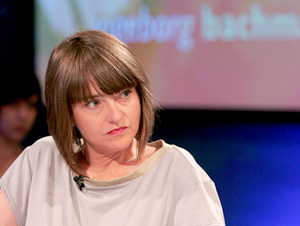
The light fell on the screen and the lens could be focussed, in white letters on a grey background she read : BANGKOK. She immediately thought of Studio 14 at the front on the shabby street, the word BANGKOK had also been below that and then FAREAST LOVE. In similar lettering, and the letters weren't straight there either (they didn't have to be). In another life Albert had gone travelling and been together with people who later could still drive the dullness from his eyes (for moments at a time). What happened? Were the conditions really so bad? The others worked in similar circumstances. The image was frayed or the opposite : in individual scraggy fringes the blackness reached over the edge of the image; tall plants, leaves and : spreading, plant-covered roofs, which remind her of something (only the light will have been different, for sure). Tour by boat through the khlongs; a woman was standing in the water, washing herself. Water tanks on the roof, antennae; along the canal and on the water rampant greenery, one would like to think : jungle. The journey continued at 18 pictures per second. Window dressing or extras. Simultaneously show and extinguish the faces of fellow-travellers/back-lighting. Temple of Calm and Temple of Dawn and temple guardians of stone, golden and reclining Buddhas and a temple of marble. Everything had scaffolding around it. The roofs. The statues, the altars. Small bells and leaves moved in the wind. Grass on the pediments. The banana trees were scaffolded and the bananas they bore, too. In the street the tourists moved just like tourists; had pushed up their sleeves, some wore shorts, all of them huge sunglasses. She heard the water, the movement of the boats on the canals, or was that rather a memory like the wind passing over the water? Two young guys were concluding a deal at the market, which was not for the curious, certainly not; and everyone immediately looked away (dramatically or discreetly). A big block of ice was being broken up, next to that pussy willows. Men strolled across a square : one dark-skinned and bare-footed and with a handkerchief on his head; another tall and thin, he, too, barefoot/it was elegant or casual; he looked at them and laughed. She first of all recognised his big teeth. She didn't know the laughter.
Gabriel stood in the hall, listened for sounds (he was searching for sounds, which could have been there : a woman's voice, talking comfortingly to a child which has just woken up or been startled/a voice on the telephone, music or silence). He felt himself to be loud, because everything was quiet; the door to the children's room ajar, the kitchen dark, he heard his breath, which was heavy. He saw the car in the parking lot, now the electric gate was in place. He was at home. He looked down the cellar stairs (perhaps), hung up his jacket, reached for the key, he liked walking barefoot through his house, here most things were certain (sometimes it still felt new; then the whole apartment should smell like the interior of a car, in which one has only covered a few miles, only : there was a bit of stale air above the old pieces of furniture, came out of the cracks, it didn't matter), no light penetrated from downstairs, no sound.
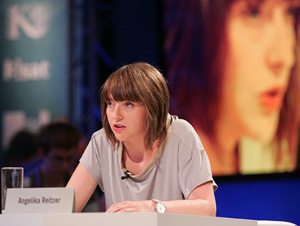
With his wife and the girls he wanted travel round half the world, strangers would meanwhile live in their house, and there were plans, how it could be financed. The woman on the exercise bike could very well imagine this family of strangers : the children refuse the vegetable soufflé, wail before going to sleep, they quarrel in the sandbox or over toys, that are scattered across the garden. They let the kitchen get dirty and forget to close the skylight in the dining room. She could almost laugh at the thought of them sleeping with one another on the almost new mattress.
She put out the light (now the garden at last lay in darkness). She switched off the lamps in the huge living room and in the hall. She inspected the front door. Gabriel listened to the breathing of his daughters, then he followed her into the bathroom. Not a word. Water flowed. Towels, clothes on the tiles, similar movements, a familiar touch, a ribbon of light lay on the carpet, next to the bed, her skin didn't tremble, he turned once/once again, they came close, tender, tired. As if they were whispering : say longing for what's there. That was. Everything was present between them, the sheet crumpled, the air between the cushions, their thighs, now only skin or the palms of hands. A thrusting, absorbing, now he and she, hold me now/hold.
She saw the women posing on the steps, how the wind caught the silk blouse of one woman, who burst out laughing. She saw these beautiful faces, the smart hairstyles of the young girls, the flat bamboo hats. Then he turned up again, it was him! Albert stood, still barefoot, in a busy street; shops and bars, hot food stalls, travel agencies and massage parlours. Sat under arches on a wall, his feet dangling. His face wasn't pale, as it had been eventually, the sun did his skin good, the corners of his mouth relaxed, the lines much deeper. She didn't notice it, suddenly a small, delicate woman could be seen at Albert's side, arm in arm. It was a completely natural movement or meeting, which she missed (again). Once she had got on his nerves so long, until he finally said the name of the woman, whom he had almost married. Now she tried to remember it and tried out : Nung and Gung and Nuh, but she no longer knew the name and so she called the woman at Albert's side Malie, which means Jasmine and which she thought suited her, she was sure to smell good.
He was so elegant.
Now Malie couldn't be seen any more. Perhaps it was because of her, that Albert no longer had any confidence in the future. Nothing more.
Probably all of it had nothing to do with his insecure circumstances and his decline or fall.
He was a different person.
It was of no importance now, what came first : the unfair contracts or Albert's tendency to fateful arguments.
He was pointing across the park or to a swimming pool.
The tuk-tuks sounding their horns and the cars sounding their horns, the throb of engines, voices of birds and people, the sounds of the heat, of the street and of the buildings, all far away. Albert burst out laughing.
The greenery grew profusely around her, she was standing in front of the house.
Perhaps Albert was like her.
The workers on the scaffolding washed out their brushes.
Translated by Martin Chalmers

